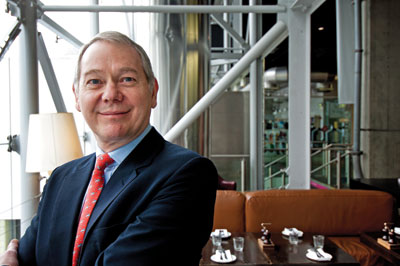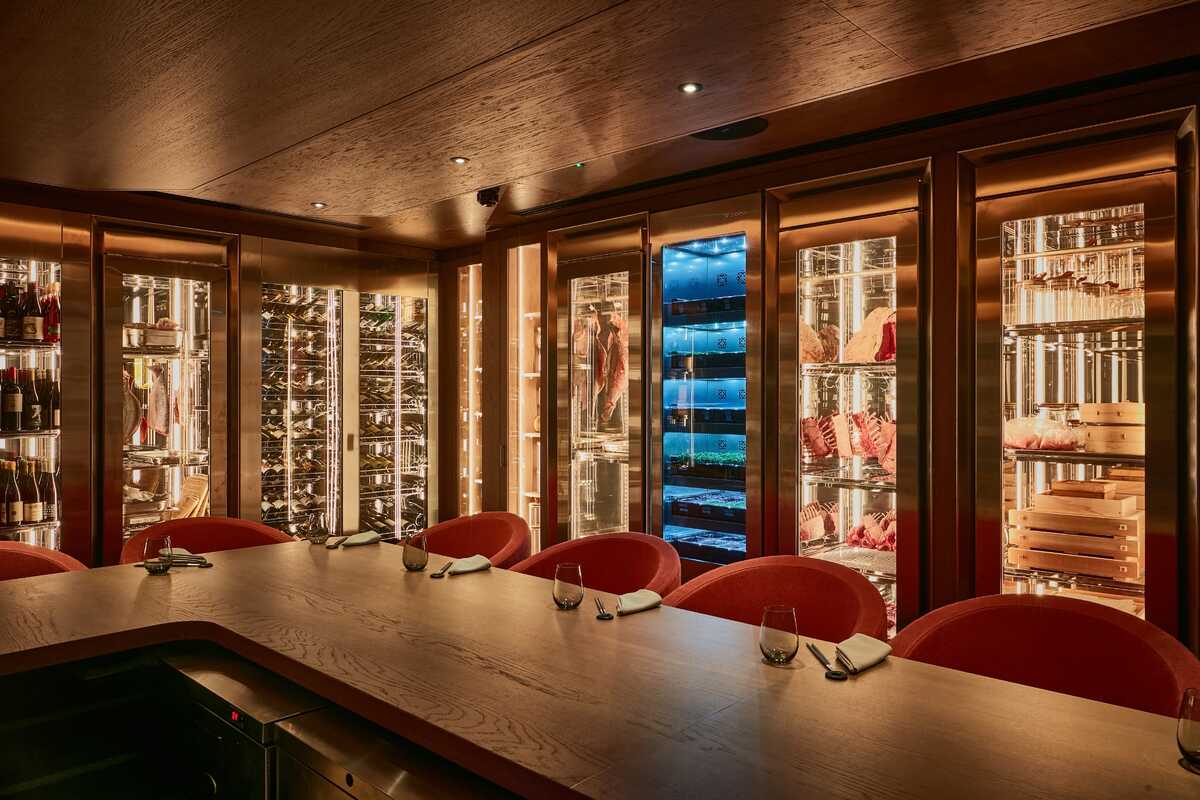Caterer and Hotelkeeper 100: Who's who in contract catering
Last week Caterer and Hotelkeeper, in association with Caterer.com, revealed its list of the 100 most influential people in hospitality. In the first of a series of articles analysing the list, we look at the biggest movers and shakers in the contract catering sector. Emily Manson reports
For the first time in its five-year history, a contract caterer has been named Caterer and Hotelkeeper's most powerful person in the hospitality industry.
Surprisingly, perhaps, it's not giant Compass topping the Caterer and Hotelkeeper
 |
Industry consultant Chris Stern says of the coup: âItâs fascinating to see how highly rated some of the smaller boutique caterers are in this list. They are pushing the big boys in terms of quality and innovation; Alastairâs move to the top of the list is testament to this.â
It marks a noticeable shift for the sector, which has also seen its profile within the wider hospitality industry evolve and increase over recent years, culminating in more caterers than ever â" 15 â" making the cut into the top 100 this year.
Tim Jones, co-founder of CH&Co and fifth on the contract caterer list, says: âIt is not before time! As the Cinderella of the catering world, maybe [contract caterers] are finally â¨getting the recognition we deserve. Between us we serve millions of people every day â" and the quality, imagination and diversity has never been greater.â
This is in a large part due to charismatic personalities such as the Joneses and Storey who are changing the face of the sector. Stern explains that the smaller operatorsâ nimbleness in the marketplace and fresh concepts have driven the sector as a whole to improve and sharpen up its act. He says: âThe rise and rise of the likes of Lexington and Harbour & Jones as well as BaxterStoreyâs growth have pushed Compass to relaunch RA (especially after losing RBS to BaxterStorey) and Sodexo to rebrand as Sodexo Prestige, with a discrete London operation.â
Compass 
While the top five names in the sector might look familiar, the latter half of the list sees a host of new entries. Six new additions to the contract catering list show how dynamic the market is currently, with some familiar faces returning, such as Bill Toner (2012âs âone to watchâ) who has now found his feet as the man in charge at Host now Jerry Brand has stepped back, while Debbie White, chief executive of Sodexo, is included for the first time â" after seeing the group win over £600m worth of business in the past few months alone.
Other first-time entrants Adam Elliott, chief executive of the Lindley Group, Andy Chappell, managing director of ISS Food and Hospitality, and Allister Richards, managing director at Mitie Catering, seem to have each cornered gaps in the marketplace, resulting in phenomenal growth and significant contract wins over a short period of time.
Hannah Horler, managing director of â¨Cartwheel Recruitment, comments: âItâs â¨nice to see so many new names on the list â¨and companies other than the usual suspects like Compass, Aramark, Sodexo and Elior who are doing well.
âThe market was really ripe for new players and there are some genuinely good new operators who are focusing on what itâs all about: good food, service and people â" factors which over the years have been to some extent lost in the big companies who have been more focused on the bottom line and disrupted through constant restructures.â
âLooking forward, it will be interesting to see how those embracing total facilities management rise up the list; Mitie and ISS may be the tip of the iceberg,â says Stern.
Another area that the contract catering sector has made great strides in this year is that of responsible hospitality. One of this yearâs Caterer and Hotelkeeper 100 judges, Mark Linehan, managing director of the SRA, explains: âOver the past year the SRA has noticed contract caterers take a much more active interest in sustainability in response to consumer and client demand.â This, he adds, has been coupled with: âa growing understanding of the benefits that come with operating in a responsible wayâ.
So where does it all go from here? Stern predicts the market may fragment more with the increase of total facilities management contracts as, âthese generally canât be serviced by the smaller players, although reception services have been embraced by some, with Lusso and BaxterStorey having separate divisions for this,â although he notes that this is still a long way from the complete solutions offered by the big boys.
Facilities management could possibly be a game changer, as will be the continued pressure to reduce or eliminate subsidies, which Stern adds: âwill be a key feature of our market I see in the coming period.â
And whatâs going to keep the sector on a roll? Well thatâs simple according to Jones, who states that itâs âinnovationâ.
âOn the B&I side of the business, the key challenge is to continue to innovate to keep employees having lunch in the workplace and not on the high street,â he explains.
âWhile on the commercial side, itâs about coming up with innovative ways to attract people to come out, eat, and spend in tough economic times. Those willing to go the extra mile will achieve the greatest success â" and that means â¨anticipating â¨the next trend and gaining first-mover advantage.â
A view from the top: Alastair Storey
 |
What do you think of the contract caterers in the 100 list this year?
âIâm not a fan of calling it contract catering as it gives the wrong impression. Weâre predominantly selling food to blue chip companies and our competitors are the high street, coffee shops and delis. Consequently thatâs what we see our business as running.
âThis kind of recognition and exposure is great for our sector, which is too often hidden because the general public canât come in, and itâs just great to see so many operators on this list.â
Â
Whatâs causing the rise and rise of the sector? âThereâs been a sea change since we set up the business in 2000. The original reason for doing it was because I didnât agree with the direction of de-skilling and the formula of one size fits all. The world isnât like that and customers are looking for something different.
âI donât want to eat lazy cooking; I want to eat something made with flair, passion and genuine feeling that someone has cared about cooking. Itâs hugely encouraging that others are recognising that as well and customers seem to appreciate it.
âWe need to ensure the trend continues but we need also to remember the motivations that itâs not just about pretty food; itâs about food that the customer wants to eat and the necessity of driving sales volumes.â
Â
What were the positives for you over the past year? âObviously it varies from company to company. Weâve had a great year and seen some really big contract wins. I feel that has a lot to do with our investment in people and training as well as our commitment to fresh food. Itâs great to know that these things which are important to us are also important to others and customers.â
Â
Whatâs in store now? âThe chancellor has forecast more doom and gloom and everyone knows the world economy is very challenging. It would be pretty â¨silly to think things will get easier so we will have to up our game â¨yet again.
âBut the good thing is that people have to eat and we can be part of the solution. Hospitality represents around 7% of GDP â" almost the same as banking â" and we shouldnât underestimate the power and possibilities if we as an industry capitalise on that. Itâs hugely important we support our industry as a whole, and bind together to fight for recognition as we can be part of the economic solution for the country.â
What would you like to see happen? âI think we should get more support and Government recognition and also as a wider industry fight for our share of attention, success and support. There are a million young people without jobs and as an industry we have great jobs and a great place for people with little or no skill but a good attitude to work their way to the top.
âChefs have become great role models and the next stop is front of house, which has been left behind. Itâs a great way to enter the industry and National Waiterâs Day and the Gold Service Scholarship are two new initiatives that will really help with this.â
Caterer and Hotelkeeper 100 Contract Caterers
1 Alastair Storey, BaxterStorey
2 Richard Cousins, Compass Group
3 Noel Mahony and John Bennett, BaxterStorey
4 Ian Sarson, Compass Group
5 Robyn & Tim Jones, CH&Co
6 Tim Hammond, Elior (new entry)
7 Debbie White, Sodexo (new entry)
8 Bill Toner, Host (new entry)
9 Patrick Harbour & Nathan Jones, â¨Harbour & Jones
10 Adam Elliott, the Lindley Group (new entry)
11 Andy Chappell, ISS Food and Hospitality (new entry)
12 Tim West and Mike Sunley, â¨Lexington Catering
13 Andrew Main, Aramark
14 Allister Richards â" Mitie Catering â¨(new entry)
15 Wendy Bartlett, Bartlett Mitchell
How we compile the list
The Caterer and Hotelkeeper 100 brings you the 100 most influential people whose achievements are having the biggest impact upon the hospitality industry in 2012. It tells you where theyâve been, where they are now and where they are going.
This year, for the first time, we opened up the selection process to nominations from the industry at large and were overwhelmed with the response.
This final list of operators includes a diverse collection of personalities, from the bosses of the biggest corporate giants to others who are pushing the boundaries of style, comfort or cuisine in their chosen field.
The Caterer and Hotelkeeper 100 covers all sectors of the industry â" hoteliers, restaurateurs, contract caterers, pub operators and chefs. Nominees in each of these five categories were judged by panel of industry experts and Caterer and Hotelkeeper journalists who specialise in those sectors. To qualify, candidates had to be based in the UK, and their power and influence should be primarily in the UK market. Shortlisted candidates were awarded marks for each of five criteria, which were then averaged out to give an overall ranking.
First consideration was the scale and scope of the operation headed by the nominees. But size isnât everything, and they were next judged on the power and influence they exert in the industry and the respect they command among their peers. We asked whether they were shapers of policy, leaders in their field, or inspiring and nurturing the next generation.
The judges then examined whether the candidates had a proven record of financial success and whether this was reflected in the eyes of their peers and the outside world.
The candidatesâ reputation for innovation was next, as the judges examined to what degree they were setting standards others wanted to copy and whether their ideas would remain in fashion.
Longevity was the fifth and final hurdle for the candidates as the panellists considered whether they â" and their creations â" would stand the test of time.
















